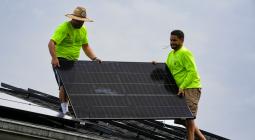EVs, Energy Efficiency Save Canadians Up to $921/Month, But Access is Slipping Away
Canadian households can save hundreds of dollars per month by ditching their gas appliances, adopting a handful of energy efficiency upgrades, and trading out their combustion vehicles for electric cars, but those savings have become harder to tap into over the last year, Clean Energy Canada concludes in a report issued this morning.
“Over the last two years, the energy transition has really been going places,” states the report, citing monthly savings of $700 for a Vancouver driver shifting to an EV, $550 for a Toronto family adopting the efficiency upgrades, and $777 for a Vancouver household that did the same.
“The picture is the same across most of the country. The equivalent household would save hundreds of dollars a month in almost every province,” the Vancouver-based think tank writes. “And to make it even better, these families would reduce the carbon footprint of their cars and homes by more than 90%.”
Clean Energy Canada released the report in tandem with a new online calculator, mycleanbill.ca, that shows users how much they can save depending on the province where they live, their housing type, and the number and type of vehicles they drive.
But getting from here to there has become more difficult over the last year, with the federal government shutting down its $5,000 Greener Homes Grant and Canada’s bestselling EVs either disappearing or becoming more expensive. Even with purchase prices falling, CEC says, polling points to up-front cost as the biggest barrier to EV purchases—and yet they’re “by far the biggest money-saving option for many households.”
The report shows monthly savings ranging from -$21 per month in Alberta to $921 in Prince Edward Island for a detached home, reflecting differences in heating type by province, with lower but still highly variable savings for townhouses and condominiums. It also counters some of the persistent myths about EVs, explaining that:
- Gas cars emit three times more pollution over their lifetimes;
- EV batteries can survive more than 20 years of driving (they often outlive the vehicle);
- The average Canadian’s daily driving range of 60 kilometres is far less than the average EV range of 480 kilometres;
- Power grids can handle the extra load from EVs with proper planning.
But while those conversations play out, “Canadians’ continued reliance on fossil fuels is costing them,” the report states, with one recent study pinpointing energy prices as the most volatile component of inflation. “Oil and gas price shocks are not new, and energy-driven inflation will keep occurring if Canada continues to be dependent on fossil fuels,” the International Institute for Sustainable Development concluded in July.
Clean Energy Canada recommends a series of measures to boost the affordability of clean energy technologies, make them more accessible, and empower consumers who want more control over their energy use and emissions.
“The shift to clean energy isn’t just a way to fight climate change—it is something we should do to make life cheaper and healthier for Canadians,” the report concludes. “While governments are already taking important steps to encourage households to lower their carbon footprint, a number of additional moves could make clean energy solutions even more accessible and affordable for all Canadians.”
Cover photo: Mitchell Beer/The Energy Mix




